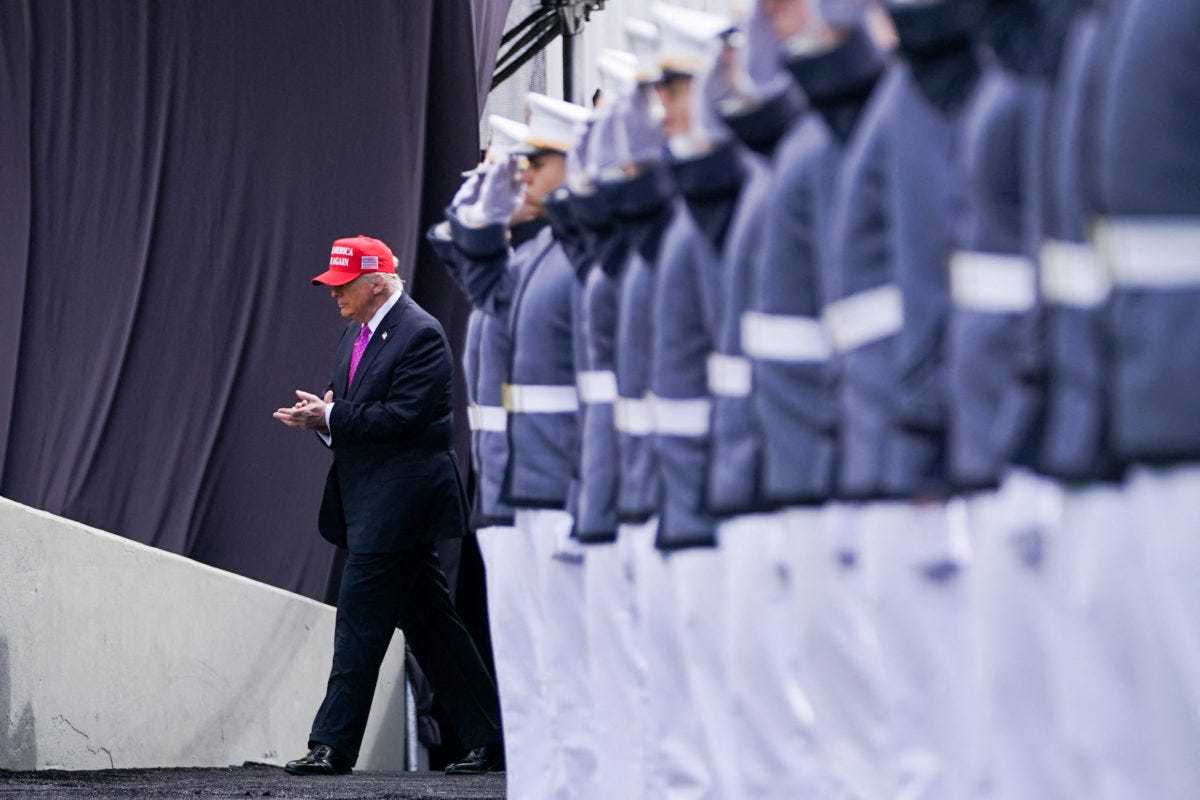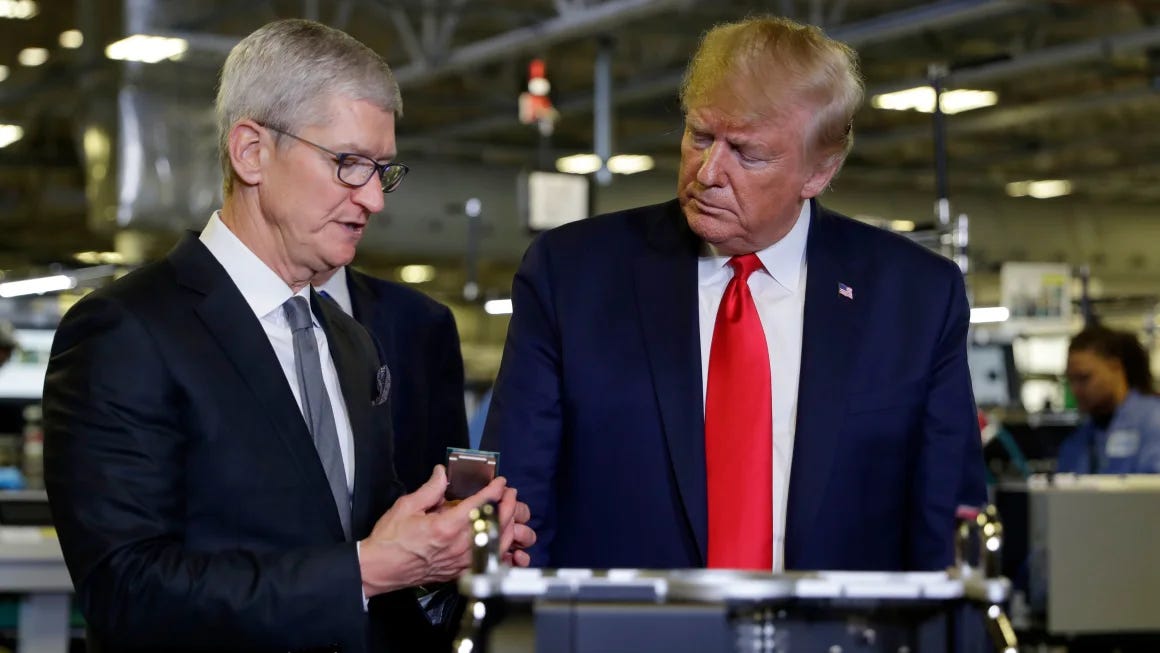Trump Week 18, Continued: Education Rulings, Trade Escalations, and Executive Power Moves
Federal rulings, new tariffs, and Harvard’s ongoing clash with the administration define the week’s second half.

Trump’s eighteenth week continued to bring developments in federal downsizing, trade, and immigration. A federal judge blocked the Trump administration’s attempt to dismantle the Department of Education—a follow-up to a previous Introspective report detailing an executive order that began disbanding the Jimmy Carter-era agency. Meanwhile, the Supreme Court ruled that President Trump has the authority to fire the heads of the National Labor Relations Board and the Merit Systems Protection Board—two independent agencies—as public backlash over the administration’s policies intensifies.
As tensions with Harvard University escalate, Trump officials on Thursday barred international students from enrolling at the university, marking a significant escalation in the ongoing legal battle between the administration and Harvard over allegations of antisemitism and free speech violations. In response, Harvard filed a new lawsuit on Friday, prompting a federal judge to temporarily block the administration’s order.
Amid rising anti-immigrant sentiment, Disney became the first major company to place its Venezuelan workers on unpaid leave. The move follows a previous Introspective report on the Supreme Court’s decision to uphold the termination of Temporary Protected Status (TPS) for more than 350,000 Venezuelan immigrants.
In trade news, tensions escalated with the European Union (EU) after President Trump threatened to impose a 50% tariff on EU imports, citing stalled negotiations. At the same time, Trump warned Apple—despite being based in the U.S.—that a 25% tariff would be imposed if the company fails to shift iPhone production to domestic facilities.
Federal Downsizing and Mass Firings
As President Trump’s initiative to downsize the federal government advances, a federal judge has blocked the administration from disbanding the Department of Education. The decision halts the enforcement of a prior executive order that had begun the process of shutting down the Carter-era agency.
“The record abundantly reveals that Defendants’ true intention is to effectively dismantle the Department without an authorizing statute,” wrote District Judge Myong Joun, noting that many services have already been disrupted.
“The idea that Defendants’ actions are merely a ‘reorganization’ is plainly not true.”
In a statement to ABC News, Department of Education spokesperson Madi Biedermann defended the administration’s actions and criticized Judge Joun for what she described as judicial overreach.
“President Trump and the Senate-confirmed Secretary of Education clearly have the authority to make decisions about agency reorganization efforts—not an unelected judge with a political axe to grind,” Biedermann said.
“This ruling is not in the best interest of American students or families. We will immediately challenge this on an emergency basis.”
In that same report, Randi Weingarten, president of the American Federation of Teachers (AFT), applauded the court’s decision.
“Today, the court rightly rejected one of the administration’s very first illegal and consequential acts: abolishing the federal role in education,” Weingarten said.
“The vast majority of Americans—and states like Massachusetts, with the highest NAEP scores—want to keep the Education Department because it ensures all kids, not just some, can get a shot at a better life.”
Simultaneously, the Supreme Court ruled that President Trump has the authority to fire the heads of independent agencies, including the National Labor Relations Board (NLRB) and the Merit Systems Protection Board. The ruling carries major implications, as presidents have historically not been permitted to remove members of these agencies without cause.
In a dissenting opinion, Justice Elena Kagan cited Alexander Hamilton and expressed concern about the long-term impact of the decision.
“To avoid an arbitrary discretion in the courts, it is indispensable that they should be bound down by strict rules and precedents,” Kagan wrote, adding that the majority’s decision “favors the president over our precedent.”
“It does so unrestrained by the rules of briefing and argument—and the passage of time—needed to discipline our decision-making. I would deny the president’s application. I would do so based on the will of Congress, this Court’s seminal decision approving independent agencies’ for-cause protections, and the ensuing 90 years of this nation’s history.”
Harvard and Immigration
As tensions with Harvard University escalate, the Trump administration has banned the university from enrolling international students amid ongoing allegations of antisemitism and free speech violations.
“As a result of your refusal to comply with multiple requests to provide the Department of Homeland Security pertinent information while perpetuating an unsafe campus environment that is hostile to Jewish students, promotes pro-Hamas sympathies, and employs racist 'diversity, equity, and inclusion' policies, you have lost this privilege,” wrote Department of Homeland Security Secretary Kristi Noem in a letter to the university.
In response, Harvard called the action “unlawful.”
“The government's action is unlawful. We are fully committed to maintaining Harvard's ability to host our international students and scholars, who hail from more than 140 countries and enrich the university—and this nation—immeasurably. We are working quickly to provide guidance and support to members of our community,” the university said in a statement.
“This retaliatory action threatens serious harm to the Harvard community and our country, and undermines Harvard's academic and research mission.”
On Friday, Harvard filed another lawsuit against the Trump administration, adding to an earlier suit that focused on free speech concerns related to protests supporting Palestine.
“With the stroke of a pen, the government has sought to erase a quarter of Harvard's student body—international students who contribute significantly to the university and its mission,” the lawsuit stated.
A federal judge later blocked the administration from implementing the ban, temporarily halting the action ahead of a scheduled hearing on Thursday.
Meanwhile, following a previous Introspective report highlighting the revocation of Temporary Protected Status (TPS) for more than 350,000 Venezuelan immigrants, Disney became the first major company to place its Venezuelan employees on unpaid leave.
“We are committed to protecting the health, safety, and well-being of all our employees who may be navigating changing immigration policies and how they could impact them or their families,” Disney said in a statement obtained by CBS News.
In the same report, union members at Disney World responded to the decision, expressing support for their Venezuelan colleagues.
“No worker should have to live in fear of losing everything after building a life here,” the union members said.
Trade Wars: European Union and Apple
President Trump threatened Friday to impose a 50% tariff on the European Union after negotiations stalled. He later moved the deadline from June to July.
“The European Union, which was formed for the primary purpose of taking advantage of the United States on TRADE, has been very difficult to deal with,” Trump wrote on Truth Social.
“Therefore, I am recommending a straight 50% tariff on the European Union, starting on June 1, 2025. There is no tariff if the product is built or manufactured in the United States. Thank you for your attention to this matter!”
Later that day, Trump said he was no longer seeking a deal and would consider delaying the tariffs if more companies increased trade with the United States.
“I’m not looking for a deal,” said Trump.
“We’ve set the deal. It’s at 50%.”
In a post on X, European Trade Commissioner Maroš Šefčovič said any agreement between the EU and the U.S. must be based on “mutual respect, and not threats.”
“The EU’s fully engaged, committed to securing a deal that works for both,” Šefčovič said.
“We stand ready to defend our interests.”
That same day, Trump also threatened to impose a 25% tariff on Apple—even though it is based in the U.S.—if iPhone production does not return to the United States.
“I have long ago informed Tim Cook of Apple that I expect their iPhones that will be sold in the United States of America will be manufactured and built in the United States, not India or anyplace else. If that is not the case, a tariff of at least 25% must be paid by Apple to the U.S.,” Trump wrote on Truth Social.

While the iPhone is primarily produced in China, Apple has increasingly shifted production to India due to the country’s more stable relationship with the U.S.
Trump also warned reporters Friday evening that similar tariffs would apply to other manufacturers, including South Korea’s Samsung, beginning in June.
“I had an understanding with Tim that he wouldn’t be doing this. He said he’s going to India to build plants. I said that’s okay to go to India, but you’re not going to sell into here without tariffs. And that’s the way it is,” said Trump.
Apple’s stock fell more than 3% on Friday following the tariff threat.





